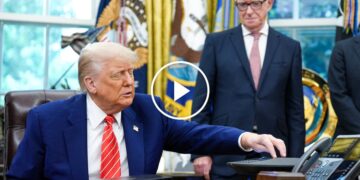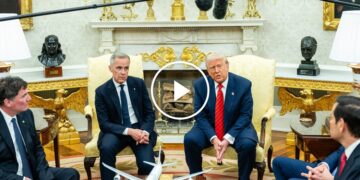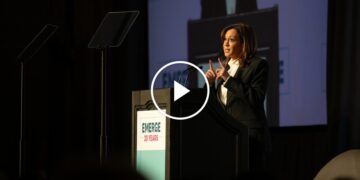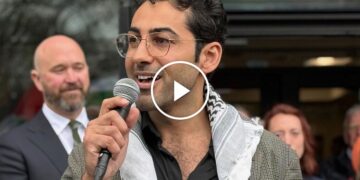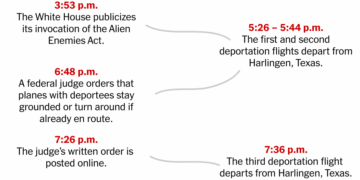The start of President Trump’s second term has been called unprecedented.
How accurate is that description?
We asked presidential historians to come up with comparisons for major Trump administration actions — if they could.
Not all historians agreed on each issue, and every presidential administration operates in a different time, with different norms and expectations. But based on the historians’ replies, we’ve categorized 22 of Mr. Trump’s actions below, ranging from those that have no parallel in the past to those that do:
No clear precedent
Mr. Trump has taken some actions that do not have a comparable historical example, according to historians.
Invoked a 1798 law to remove unauthorized immigrants
TRUMP’S ACTIONS
Mr. Trump is attempting to use a wartime law, the Alien Enemies Act of 1798, to deport Venezuelan migrants. His actions have been challenged up to the Supreme Court, which temporarily blocked deportations under the law on April 19.
IN THE PAST
Presidents have invoked the law during three wars, including World War II, when it was part of the rationale behind Franklin D. Roosevelt’s executive order that led to the internment of around 120,000 people, mostly of Japanese heritage. (In the following decades, the government has issued formal apologies for its actions.) But the law has never before been used to remove unauthorized immigrants, historians said.
“The Alien Enemies Act of 1798 was created in order to help the government of the United States put down potential foreign sabotage and espionage during times of war.”
Scott Kaufman
Professor of History, Francis Marion University
No clear precedent
Dismantled a federal government agency or department
TRUMP’S ACTIONS
Mr. Trump has dismantled the United States Agency for International Development by cutting almost every position and ending almost all funding. Congress has not approved the plan.
IN THE PAST
Other presidents have successfully shut down agencies, often as part of an effort to make government more efficient, but only by working with Congress.
In the early 1970s, President Richard Nixon’s attempts to shut down a federal antipoverty agency failed after a judge found that his administration did not have the legal authority to do so. In 1981, President Ronald Reagan succeeded in shutting down the agency’s successor, the Community Services Administration, but in that case he had the authorization of Congress.
“Unilateral presidential abolishment of an agency or department is unprecedented. Congress has jealously guarded its control over government organization.”
Joseph A. Pika
James R. Soles Professor Emeritus, University of Delaware
No clear precedent
Renamed an international body of water
TRUMP’S ACTIONS
President Trump ordered that the Gulf of Mexico be renamed the Gulf of America.
IN THE PAST
Unprecedented, historians told The New York Times. (The U.S. has at times called the “Persian Gulf” the “Arabian Gulf,” which Iran has objected to, but no president has made a formal attempt to change the name.)
No clear precedent
Withheld federal funding from a university
TRUMP’S ACTIONS
The Trump administration has threatened to withhold billions in federal dollars to colleges that don’t comply with its demands. At Columbia, where $400 billion in funding was canceled, those demands included putting in stricter security procedures and appointing someone to oversee its Middle Eastern, South Asian and African Studies department. Harvard, which is fighting administration demands, has had more than $2 billion in federal grants withheld.
In January, Mr. Trump also signed an executive order saying federal funds would not go to schools that mandate Covid-19 vaccines.
IN THE PAST
In a 2012 speech, President Barack Obama threatened to keep funds from colleges that kept hiking tuition, but he never followed up on the threat.
In the 1970s, the Internal Revenue Service under the Nixon administration said it would revoke the tax-exempt status of Bob Jones University because it refused to admit nonwhite students. That would have cost the university significantly, but it was not a revocation of direct federal funding. (The Trump administration has threatened the tax-exempt status of Harvard, in addition to withholding funding.) After a long legal battle, the Supreme Court ruled in favor of the government against Bob Jones.
“President Trump’s recent actions to withhold $400 million in federal funds from Columbia University do not have a comparable presidential precedent.”
Nicole Anslover
Associate Professor of History, Florida Atlantic University
No clear precedent
Declared a national emergency related to energy
TRUMP’S ACTIONS
Mr. Trump declared a “national energy emergency” when he took office, claiming that energy production was “far too inadequate” to meet the nation’s needs. (The declaration of a national emergency grants the president additional powers.)
IN THE PAST
Presidents Richard Nixon and Jimmy Carter both moved aggressively to deal with oil shortages (there is none now), but neither declared a formal national emergency. Nixon faced soaring oil prices during the OPEC embargo, and Carter faced shortages related to the Iranian revolution. Carter and Nixon strongly encouraged Americans to reduce their energy use.
No clear precedent
Issued more than 100 executive orders in his first 100 days
TRUMP’S ACTIONS
President Trump has issued more than 130 executive orders since taking office, ranging from establishing a Department of Government Efficiency to halting refugee admissions.
IN THE PAST
President Franklin D. Roosevelt signed 99 executive orders in his first 100 days. He also signed 77 bills into law. (Mr. Trump has signed five.)
“The extent to which the Trump administration is willing to issue E.O.s that do not have basis in any clear authorization — either from Congress or from the Constitution — is quite striking.”
Annie Benn
Assistant Professor of Political Science, Colgate University
No precedent in the modern era
For some of Mr. Trump’s actions, the closest comparisons come from an earlier era of U.S. history. We’re defining the modern presidency as the years after World War II, after President Franklin D. Roosevelt’s administration expanded the executive branch and created a more complex bureaucracy.
Ignored a federal judge’s order
TRUMP’S ACTIONS
The Trump administration has defied several federal judges’ orders, including by freezing money that courts ordered it to spend, ignoring instructions to return planes carrying immigrants to El Salvador, and defying a Supreme Court ruling to facilitate the return of one wrongly deported immigrant to the U.S.
IN THE PAST
President Andrew Jackson did not enforce a Supreme Court order in the 1830s, ignoring a ruling that the Cherokee Nation was an independent political community. This ultimately led to the Trail of Tears, the eviction and forced migration of tens of thousands of Indigenous people.
Three decades later, at the outset of the Civil War, President Abraham Lincoln also defied the Supreme Court. The chief justice told Lincoln that his decision to suspend habeas corpus was not constitutional, while acknowledging that the court had no power to stop the president. Lincoln ignored the order.
“There are rare historical instances of presidents ignoring court orders, but not as a regular order of business. However, district judges issuing national injunctions is a relatively recent and controversial procedure. It’s been used by conservative and liberal judges, but its use spiked dramatically in the first Trump term relative to earlier presidents.”
Caleb Verbois
Professor, Grove City College
No precedent in the modern era
Tried to assert broad power over independent federal agencies
TRUMP’S ACTIONS
President Trump has fired members of numerous independent agencies that were created by Congress to be independent of the White House. That includes people who served on the National Labor Relations Board, the Merit Systems Protection Board, the Equal Employment Opportunity Commission and the Federal Trade Commission.
He has also fired inspectors general without notifying Congress, threatened to fire the chair of the Fed and attempted to gut the Consumer Financial Protection Bureau.
Many of these actions have been challenged in court.
IN THE PAST
In 1933, Franklin D. Roosevelt fired a member of the F.T.C. — William Humphrey — over policy positions that he disagreed with. The Supreme Court ultimately ruled that the president was not allowed to fire a commissioner, except in the case of “inefficiency, neglect of duty, or malfeasance in office,” which effectively strengthened protections for such agencies for the next century.
“All presidents seek to influence independent agencies with their appointments, and some try to influence them with persuasion. We have to go back to F.D.R. to find a president who tried to fire officials without finding inefficiency, neglect of duty or malfeasance in office.”
George C. Edwards III
Distinguished Fellow, University of Oxford, and University Distinguished Professor and Jordan Chair Emeritus, Texas A&M University
No precedent in the modern era
Ordered or called for an end to birthright citizenship
TRUMP’S ACTIONS
Mr. Trump issued an executive order denying birthright citizenship to the children of undocumented immigrants and foreign residents, under his interpretation of the 14th Amendment. The policy is temporarily blocked, and the Supreme Court will soon hear arguments.
IN THE PAST
Andrew Johnson opposed the 14th Amendment, including birthright citizenship, but it passed despite him.
In the late 1800s, President Grover Cleveland’s administration tried to challenge the rule as it applied to Chinese immigrants, but the Supreme Court ruled against that, affirming birthright citizenship and settling the topic for more than a century.
No precedent in the modern era
Wanted to acquire another nation’s sovereign land
TRUMP’S ACTIONS
Mr. Trump has repeatedly discussed his desire to expand the country’s territorial borders, including by acquiring Greenland, the Panama Canal and even Canada.
IN THE PAST
This was very common in early U.S. history, and then very rare in recent times. The most recent example that historians provided: In 1946, the Truman administration offered to buy Greenland from Denmark, in the leadup to the Cold War. Denmark refused, and the offer was kept secret for decades.
“Mr. Jefferson’s Louisiana Purchase; the annexation of Texas; national expansion to the southwest and California; and occasional trial balloons about the acquisition of Cuba — there is a long history of such efforts. But these impulses have been largely dead since at least the middle of the 20th century.”
Russell Riley
Co-chair, Presidential Oral History Program, University of Virginia’s Miller Center
No precedent in the modern era
Imposed universal tariffs
TRUMP’S ACTIONS
President Trump has instituted tariffs of more than 100 percent on China, and 10 percent on other trading partners. One estimate from Yale put the new average tariff rate at 28 percent, the country’s highest since the early 20th century.
IN THE PAST
Mr. Trump put in major tariffs on specific Chinese goods in his first term, and President Joe Biden added more. But those targeted specific items; universal tariffs have little precedence in the modern era. Richard Nixon implemented 10 percent tariffs for several months in 1971 when the country expected fluctuations in exchange rates, using a statute that was a precursor to the one Mr. Trump invoked.
The last time the U.S. imposed high tariffs was with the Smoot-Hawley Tariff Act of 1930, passed by Congress and signed into law by President Herbert Hoover. They significantly raised duties for thousands of imports.
“There was a time, many years ago, when tariffs were seen as a means of regulating commerce internationally. But in the post-World War II era, ‘free trade’ has been the preferred method.”
Michael A. Genovese
President of the Global Policy Institute, Loyola Marymount University
Has happened, but under different circumstances
In several cases, Mr. Trump’s actions are clearly precedented — but there are details that make the cases different. They may differ in scale, context, motivation or results. The following are events in which our scholars did not always agree on how much of a precedent there was.
Promoted a brand at the White House
TRUMP’S ACTIONS
President Trump hosted several Tesla cars (and a Cybertruck) with Elon Musk in the White House driveway.
IN THE PAST
Other presidents have hosted actors, sports teams and entertainers at the White House and promoted charities. Presidents have often promoted “Made in America” brands, and recent Democratic presidents have boosted electric vehicles in particular: President Obama talked about driving a Chevy Bolt; President Biden promoted the Ford F-150 pickup truck with a test drive. Neither company’s C.E.O., however, was a close adviser to the president as Mr. Musk is to Mr. Trump, and those events did not take place at the White House.
“From the very start of his first term in office when he chose not to divest from his business holdings, this president has broken all sorts of formal and informal practices regarding profiteering off the presidency. There is no parallel to his recent promotion of Tesla on the White House lawn or of his internet promotion of his own memecoin.”
Stephen F. Knott
Emeritus Professor of National Security Affairs, United States Naval War College
Has happened, but under different circumstances
Removed a government appointee with a fixed term
TRUMP’S ACTIONS
President Trump has fired or otherwise replaced at least five officials with fixed terms, including the F.B.I. director, the director of the Consumer Financial Protection Bureau, the head of the Transportation Security Administration, the head of the I.R.S. and the commandant of the Coast Guard.
IN THE PAST
These officials aren’t expected to rotate in and out when a new president takes office, unlike with traditional political appointees. Presidents can remove these kinds of appointees, but traditionally they don’t.
Bill Clinton did it in 1993, firing the F.B.I. director at the time over alleged misconduct. During his first term, Mr. Trump fired the F.B.I. director James B. Comey, who was leading a criminal investigation into links between Mr. Trump’s advisers and Russia.
“Presidents often remove government appointees, but rarely en masse. Presidents generally prefer not to appear partisan in handling government appointees, and they want their own appointees to last during the next presidential administration.”
Jeremi Suri
Professor of History, University of Texas at Austin
Has happened, but under different circumstances
Expelled an ambassador from another country
TRUMP’S ACTIONS
The Trump administration expelled South Africa’s ambassador to the United States, Ebrahim Rasool, in March. Secretary of State Marco Rubio wrote on social media that Mr. Rasool was “no longer welcome” in America and he linked to an article in which Mr. Rasool made anti-Trump comments.
IN THE PAST
In 2008, President George W. Bush expelled Venezuela’s ambassador and declared Bolivia’s envoy “persona non grata.” Both of those countries had expelled U.S. ambassadors. Other presidents have done this, particularly during the Cold War.
“Presidents do expel ambassadors, but normally because of rising tensions between nations, not merely because someone has made a comment critical of the President.”
Caleb Verbois
Professor, Grove City College
Has happened, but under different circumstances
Gave a speech at the Justice Department
TRUMP’S ACTIONS
Mr. Trump visited the Justice Department in March, where he used his remarks to criticize his political enemies, calling them “scum” and naming some.
IN THE PAST
President Obama, President Clinton and others have visited and given remarks at the Justice Department. One Obama speech in 2014 focused on a review of intelligence programs; Clinton spoke about the crime bill he was trying to pass. But historians said there are no previous examples of presidents using an official visit to call for the prosecution of enemies.
“Presidential speeches at the Department of Justice headquarters are practically a routine of the modern presidency. Most often that venue is selected for the president to show appreciation to law enforcement officers and prosecutors, and to affirm their commitment to law and order.”
Russell Riley
Co-chair, Presidential Oral History Program, University of Virginia’s Miller Center
Has happened, but under different circumstances
Halted funding authorized by Congress
TRUMP’S ACTIONS
Primarily through Elon Musk’s Department of Government Efficiency, the Trump administration has canceled or paused billions of dollars in grants, contracts and programs previously authorized by Congress. In some cases, federal courts have blocked the administration’s efforts.
IN THE PAST
The best parallel is President Nixon, who frequently refused to spend funds appropriated by Congress. Courts ruled against him, and his actions led Congress to pass the Impoundment Control Act of 1974, which formalized limits on presidential control over spending. Mr. Trump has said he wants the courts to strike down that law.
“Richard Nixon was the godfather of impounding funds, although presidents have — on a very limited basis — done this since Thomas Jefferson.”
Michael A. Genovese
President of the Global Policy Institute, Loyola Marymount University
Has happened, but under different circumstances
Offered large-scale buyouts to federal workers
TRUMP’S ACTIONS
In an email, the Trump administration offered millions of federal employees — the vast majority of the work force — the option to resign but continue to be paid through the end of September.
IN THE PAST
President Clinton’s administration offered some 70,000 buyouts, at $25,000 each, with congressional approval. They were tailored for specific kinds of workers based on individual agency plans.
“The administrations of George H.W. Bush and Bill Clinton offered targeted buyouts to specific types of workers, but those initiatives would not be considered as ‘large scale’ as what we’ve seen recently.”
Robert Schmuhl
Professor Emeritus of American Studies and Journalism, University of Notre Dame
Has happened, but under different circumstances
Pardoned more than 1,000 people
TRUMP’S ACTIONS
President Trump pardoned nearly all of the 1,600 people charged in connection with the Jan. 6 insurrection, including people who committed violent and nonviolent crimes.
IN THE PAST
When he took office in 1977, President Carter issued a blanket pardon to almost all the men who had evaded the draft for the Vietnam War, which numbered in the hundreds of thousands. Andrew Johnson pardoned thousands of former Confederate soldiers in 1868. While several other presidents issued more than 1,000 pardons and commutations, most have waited until the end of their terms.
Has happened, but under different circumstances
Sent migrants to a military base
TRUMP’S ACTIONS
Mr. Trump has sent hundreds of migrants, largely from Venezuela and Nicaragua, from U.S. soil to the Guantánamo Bay Naval Base. The Pentagon has said that migrants are there temporarily on their way to a final destination.
IN THE PAST
Presidents Gerald Ford, Jimmy Carter, George H.W. Bush, Bill Clinton and Barack Obama are among the U.S. leaders who have, at various points, sent migrants to military bases. Ford housed Vietnamese refugees at a base, where they could take English classes, before they were resettled.
Bush and Clinton sent Haitian and Cuban asylum seekers intercepted at sea to Guantánamo, leading to a court battle over their legal rights and setting the stage for the use of Guantánamo as a place to hold terror suspects after the Sept. 11 attacks. President Obama temporarily sheltered thousands of unaccompanied migrant children at military bases across the country, and so did Mr. Biden.
“In most of those previous cases, military bases were employed because they had the resources to offer immediate logistical and humanitarian assistance, not as a quasi-federal prison.”
Jeffrey Engel
David Gergen Director of the Center for Presidential History, Southern Methodist University
Not uncommon
A few of Mr. Trump’s moves are, if not standard practice, still actions that other U.S. presidents have taken in recent decades.
Withdrew from an international organization or international pact
TRUMP’S ACTIONS
Mr. Trump has ordered the U.S. withdrawal from the Paris Agreement, the World Health Organization and the United Nation’s Human Rights Council.
IN THE PAST
President Carter terminated a defense treaty with Taiwan. President George W. Bush withdrew from the Kyoto Protocol, and President Reagan from UNESCO. Other presidents have refused to join international organizations or implement international agreements.
“While Trump’s exit from multiple international organizations may be more dramatic than other presidents’ actions, it’s not unprecedented.”
David Greenberg
Professor of History, Rutgers University
Not uncommon
Instituted a federal hiring freeze
TRUMP’S ACTIONS
During his first hours in office, Mr. Trump froze hiring for most federal government workers. The order said that members of the military and jobs related to national security or public safety would be exempted, but there were reports of disrupted hiring for related roles, including F.B.I. employees and federal firefighters.
On April 17, Mr. Trump extended the freeze for another three months.
IN THE PAST
Mr. Trump froze hiring across the government for 79 days in his first term, and the Reagan, Carter, George H.W. Bush, Clinton and Obama administrations all paused hiring for at least some positions for a period of time. George W. Bush slowed hiring but did not put in a full freeze.
A 1982 report by the U.S. Government Accountability Office found that the hiring freezes of the late 1970s and early 1980s “had little effect on federal employment levels.”
Not uncommon
Renamed a mountain
TRUMP’S ACTIONS
Mr. Trump signed an executive order returning Denali, North America’s tallest mountain, to its earlier name, Mount McKinley.
IN THE PAST
There are several recent examples of presidents renaming mountains or other natural features. Mount McKinley was officially named for President William McKinley until the Obama administration renamed it Denali, its Alaska Native name, in 2015.
Under President Biden, the Department of Interior renamed more than 600 geographic features that included a slur for Native women.
About the data
For this project, we reached out to dozens of historians, including some participants of C-SPAN’s Presidential Historians Survey. We asked them to provide us with relevant precedent to specific Trump actions, if there were any, and to describe how those precedents were and were not similar to what Mr. Trump has done.
We received responses from 35 presidential historians. In addition to those we quoted, we used notes and research from: Jean H. Baker, Thomas Balcerski, Kevin M. Baron, Bradley J. Birzer, Orville Vernon Burton, Jordan Cash, Lindsay M. Chervinsky, Alexis Coe, Michael Gerhardt, Harold Holzer, Chandler James, Gbemende Johnson, Bruce Miroff, Barbara A. Perry, Andrew Rudalevige, Marc J. Selverstone, Craig Shirley, Brooks D. Simpson, Mark K. Updegrove, Justin Vaughn, Ted Widmer and David B. Woolner.
We categorized actions based on the overall responses from historians, along with additional reporting and research.
Justin Vaughn and Brandon Rottinghaus of the Presidential Greatness Project assisted in establishing a list of historians and constructing the survey.
Read the full article here


